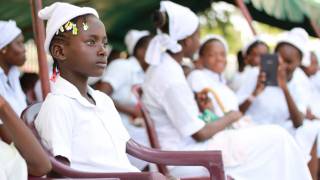Sooner the Better With HPV Vaccination

Although the importance of cervical cancer prevention is well known, many human papillomavirus (HPV) vaccinations actually occur later than recommended.
Further, as young women continue to age, the forecastable health benefits of HPV vaccines diminish quickly.
Using data from the National Health and Nutrition Examination Survey to estimate the proportion of females who were vaccinated against HPV-16/18 prevalence before their sexual debut, researchers found vaccination by age 12 is estimated to prevent most lifetime cervical cancers caused by HPV-16/18.
But this significant benefit decreases by about 25% as the vaccination age increases to 16 years.
To ensure maximum effectiveness from vaccination, pediatricians may stress the importance of timely HPV vaccination, wrote these researchers.
This Research Letter was published by The JAMA Network on October 21, 2022, among the 4,727 female individuals (mean 17.9 yrs) ever eligible for vaccination, cervical HPV-16/18 prevalence decreased from 6% (95% CI, 4%-7%) in the unvaccinated group to 3% (95% CI, 1%-6%) in the post-sexual activity debut group and less than 1% (95% CI, <1%-1%) in the pre-debut group.
HPV-16/18 prevalence was 89% (P < .001) lower in the pre-debut group but only 41% (P = .29) lower in the post-debut group compared with the unvaccinated group.
Compared with post-debut vaccination, pre-debut vaccination was associated with an 82% (P = .08) reduction in HPV-16/18 prevalence.
Differences by race and ethnicity were negligible, as the proportions of vaccinated Asian and White participants were slightly higher than those of Black and Hispanic participants (57% and 58% vs. 54% and 52%; P = .22).
Similar proportions of participants were vaccinated before their sexual debut (32%-35%).
A study limitation is that NHANES 2011 to 2018 data may be subject to recall bias. And further studies are needed to check whether these vaccination patterns persist in the 2020s.
The Study's Corresponding Author: Didem Egemen, Ph.D., Division of Cancer Epidemiology and Genetics, National Cancer Institute, National Institutes of Health (didem.egemen2@gmail.com). No industry conflicts of interest were disclosed.
There are effective HPV vaccines endorsed by the U.S. CDC, World Health Organization, and European Medicines Agency that protect males and females against cancers caused by HPV.
In the U.S., HPV vaccination is recommended beginning at age 11; however, vaccination can be started at age 9, says the CDC.
HPV vaccines, such as Gardasil 9®, are generally offered by most clinics and pharmacies in the U.S.
As with any vaccination, having an informed discussion with a healthcare provider is very beneficial.
Additional HPV vaccine research is posted at PrecisionVaccinations.com/HPV.
PrecisionVaccinations publishes fact-checked, research-based vaccine news manually curated for mobile readers.
Our Trust Standards: Medical Advisory Committee
























